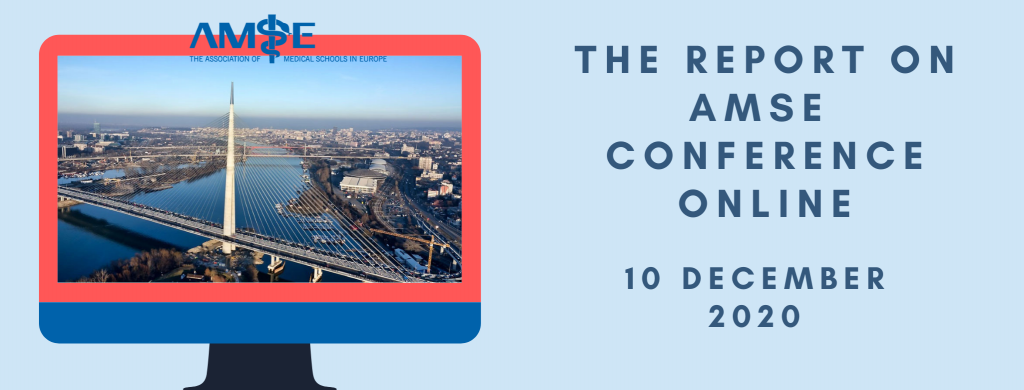
On December 10, 2020, organized by Faculty of Medicine University of Belgrade, Serbia, AMSE annual conference took place.
After the Opening address of Prof. Harm Peters, which included an overview of all the regions, members and mission of the Association of Medical Schools in Europe (AMSE), the participants were welcomed by the Dean, Prof. Nebojsa M. Lalic.
The conference started with a keynote lecture given by Professor Trevor Gibbs, entitled “The importance of faculty development for modern medical education”. The keynote lecture was chaired by Prof. Harm Peters (Germany). The lecture focused on faculty development and technology-enhanced learning in the light of the dynamic world of change, both seen as an imperative for higher training establishment. He highlighted the need to produce a diversity of healthcare professionals with common core standards and adapt to circumstances such as the current pandemic.
The keynote lecture was followed by the first session entitled “Online vs in-person learning: advantages and disadvantages”, chaired by Prof. Vladimir Palicka (Czech Republic), Prof. Algirdas Utkus (Litvania) and Prof. Sergio Tabagari (Georgia). The session included three lectures. The first lecture, entitled “Online teaching and learning related to medical knowledge” was presented by Prof. Peters. It offered examples of the new learning environment such as TELLme online platform, using MCQs. The second lecture, entitled “Teaching clinical skills online” was presented by Prof. Lalic (Serbia). It included recommended principles of good online teaching practices, the modified 4-stage approach focused on consolidation, with different examples of online programs. The third lecture entitled “Experiences of combined online/in-person teaching” was given by Prof. Dusan Suput (Slovenia). It focused on the good scientific background, especially in pandemics, where practical work is not feasible. With an overview of positive and negative experiences in teaching online clinical courses, the conclusion was that ethical considerations should be present side by side with educational needs. The Executive Committee Meeting followed the session.
The second session entitled “MD, PhD and the healthcare systems” consisted of 3 lectures and it was chaired by Prof. Suput, Prof. Lalic and Prof. Viorel Scripcariu (Romania). The first lectureby Prof. Robert Harris (Sweden) was entitled “MD/PhD courses: lessons to be learned”. It offered an overview of PhD education in Sweden, with challenges balancing between medical training and research. It was followed by a lecture entitled “Professional specializations and PhD courses: where are we now?” by Prof.Tatjana Pekmezovic (Serbia). It addressed the Orpheus standards and the need for improvement in PhD candidates’ clinical research to balance their clinical work and research involvement. The third lecture given by Prof. Janusz Janczukowicz (Poland) was entitled “Medical professionalism – a core concept in medical education”. The lecture tackled medical professionalism, how to measure it, taking into account local, national and international differences in approach to teaching, learning and assessment.
The meeting was completed by the panel entitled “New WFME standards”. The moderators of the panel were Prof. David Gordon (UK and CH) and Prof.Peters. After the introduction made by Prof. Gordon, Prof. Norcini (UK), Prof. Suput and Prof. Harris, involved as a panellist, created a lively discussion that tackled WFME standards for medical education, its origins, outcome and future.
The concluding conference activity was the General Assembly meeting, followed by the closing ceremony.
The conference attracted 157 participants from 18 countries: Argentina, Austria, Bosnia and Hercegovina, Czech Republic, France, Georgia, Germany, Hungary, Italy, Lithuania, Macedonia, Montenegro, Poland, Romania, Russia, Serbia, Slovenia, and Spain.
You can download the conference programme.

